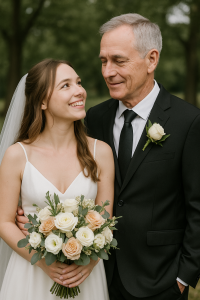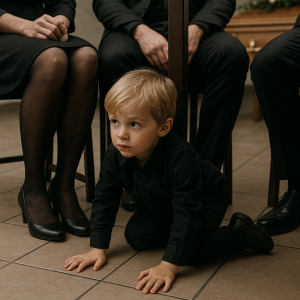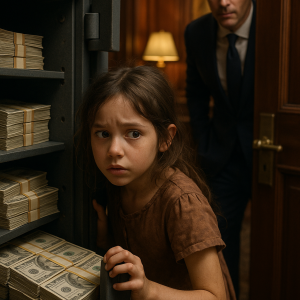When twenty-one-year-old Clara Williams walked into the courthouse on a crisp autumn morning, a bouquet of pale lilies trembling in her hands, every eye in the room turned toward her. Her delicate smile wavered under the weight of whispers that followed her steps. At her side stood Henry Whitmore, a dignified man of sixty, dressed in a perfectly tailored navy suit. His silver hair glistened in the sunlight pouring through the courthouse windows, and his calm composure only fueled the hushed speculation around them.
To outsiders, the marriage looked mismatched, even scandalous. But to Clara, this was not about appearances — it was about survival. This was the day she became a 60-year-old’s bride to protect her family.
A Daughter’s Desperation
Clara had always been the dependable one. Brilliant in her studies, diligent in her part-time jobs, and admired by professors, she was the kind of student universities praised as “exceptional.” But behind her achievements was a home filled with struggle.
Her father, Robert Williams, had lost his factory job nearly two years earlier. Her mother, Elaine, cleaned houses until her back ached and her hands were raw from scrubbing. Their financial woes worsened when her younger brother, Daniel, only ten years old, was diagnosed with a heart condition requiring surgery they couldn’t afford.
Debt collectors called relentlessly. The refrigerator was often empty, and winter promised to be harsh. Clara tried everything: scholarships, tutoring jobs, and endless applications for financial aid. But the medical bills were overwhelming, and the night she found her mother crying quietly over a stack of unpaid notices, Clara vowed she would find a way.

The Proposal That Changed Everything
The path appeared unexpectedly through a woman she had been tutoring for months — Mrs. Carter, an elderly widow with a sharp wit and fondness for Clara’s company. One afternoon, over tea, Mrs. Carter shared a peculiar story.
“I once knew a man who married not for love, but for trust,” she said thoughtfully. “He wanted someone kind to inherit his estate and protect it from greedy relatives.”
Clara had laughed it off, dismissing it as something out of a novel. But the idea stuck in her mind like a haunting melody.
A week later, Mrs. Carter handed Clara a small card. On it was the name Henry Whitmore. “He’s not looking for romance,” she explained gently. “He simply wants his life’s work to mean something. He’s tired of watching relatives circle like vultures, waiting for him to die. He wants a partner — someone honest, someone who can be trusted.”
Clara hesitated. But when Daniel collapsed at school and was rushed to the hospital, she realized she had no choice left. That night, her hands trembling, she dialed the number.
Meeting Henry Whitmore
Henry was unlike any man Clara had ever met. A retired architect with a reputation for brilliance, he lived in a restored country estate outside the city. Though his voice carried the weight of years, it was warm, calm, and reassuring. He spoke of books, music, and sunrises, not of power or money.
“I don’t believe marriage must always be about romance,” Henry told her during their second meeting. “It can also be about respect, about creating something meaningful together.”
Clara admitted her truth. “I’m considering this because of my family. My brother needs surgery. We have debts we cannot pay.”
Henry nodded. “And I need someone who can carry forward my work, someone who will not let my estate be wasted by people who never cared about me. If we help each other, perhaps we both find peace.”
Their arrangement was clear: Clara would marry him, live in his estate, and continue her studies. She would help manage his charitable foundation. In return, Henry would cover Daniel’s surgery and free her family from crushing debt.
Two weeks later, they were married in a quiet civil ceremony.
A Marriage of Respect, Not Romance
Life with Henry was far from what Clara feared. He treated her not as a possession, but as a partner. They lived in separate rooms, shared meals, and built routines that felt oddly comforting. He encouraged her to pursue graduate school, attended her graduation with pride, and even cheered as she began restructuring his foundation to fund scholarships for underprivileged students.
For the first time, Clara’s family knew stability. Daniel recovered from surgery, her parents regained hope, and Clara herself began to flourish in ways she hadn’t imagined. The once-silent estate filled with music and laughter when Clara taught Daniel to play piano in the drawing room.
“I never thought I’d hear joy in these halls again,” Henry said softly one evening.
“And I never thought I’d be the one bringing it,” Clara replied.
The Letter
On Clara’s twenty-fifth birthday, Henry surprised her with a trip to Scotland. They explored ancient castles, strolled through misty hills, and shared quiet evenings by the fire. On their final night, Henry handed her a worn envelope.
“I wrote this before our marriage,” he explained. “But I wanted you to read it only when the time felt right.”
Inside was a heartfelt letter.
Dear Clara,
If you’re reading this, thank you. Thank you for bringing sunshine into the last years of my life. The doctors warned me long ago about my heart condition. I never told you because I didn’t want pity or fear to cloud our agreement. I chose you not just to protect my estate, but because I wanted my final chapter to mean something. You’ve given me that gift.
If I am gone, everything I have is yours — the estate, the foundation, the accounts. If I am still here, then let’s eat cake. You’re twenty-five, after all.
With respect and gratitude,
Henry
Clara’s eyes filled with tears as she folded the letter. Henry smiled gently and whispered, “I’m still here. So yes, let’s go eat cake.”
Legacy and Love
Against doctors’ predictions, Henry lived another five years. During that time, Clara expanded the foundation into a regional powerhouse, helping hundreds of students. She earned her master’s degree in public administration and declined lucrative offers from large nonprofits, choosing instead to continue Henry’s mission.
When Henry passed peacefully at sixty-seven, the town grieved. At his funeral, Clara stood with her family and dozens of young scholars whose lives had been transformed by the foundation.
“Many questioned our marriage,” Clara said softly, her voice steady despite tears. “But Henry gave me the greatest gift — not just a second chance, but a purpose. And I will carry that forward.”
Clara did not remarry immediately. Instead, she poured herself into the foundation, expanding its reach nationwide. One day, in the dusty library of the estate, she discovered Henry’s old architectural sketches for a children’s hospital he had never built. She decided to make his dream real.
Three years later, the Henry Whitmore Children’s Wellness Center opened its doors, filled with light, murals, and laughter. It became a beacon of hope for families across the region.
A New Chapter
At thirty-two, Clara once again stood before a courthouse — this time not as a bride, but as a leader, holding blueprints in one hand and the hand of Michael Grant, a fellow architect and friend, in the other. Their bond was gentle, patient, and built not on desperation but genuine love.
People still whispered, as they always had.
“She was the girl who married a 60-year-old man.”
But now, the whispers carried a different tone.
“She turned it into something extraordinary.”
And when Clara visited Henry’s memorial bench beneath the willow tree, lilies in hand, she would whisper softly:
“Thank you, Henry. For believing in me, for saving my family, and for giving me the strength to become who I am.”
And in the stillness, the wind through the branches seemed to echo back:
“Thank you, Clara.”









